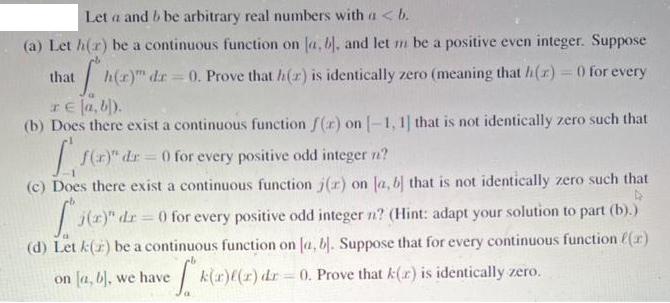Question
Let a and b be arbitrary real numbers with a < b. (a) Let h(r) be a continuous function on [a, b], and let

Let a and b be arbitrary real numbers with a < b. (a) Let h(r) be a continuous function on [a, b], and let m be a positive even integer. Suppose that ["h(z) dr = 0. Prove that h(r) is identically zero (meaning that h(r) - 0 for every re [a,b]). (b) Does there exist a continuous function f(r) on 1-1, 1] that is not identically zero such that f(r)" dr = 0 for every positive odd integer n? (c) Does there exist a continuous function j(r) on [a, b] that is not identically zero such that j(x)" dr = 0 for every positive odd integer n? (Hint: adapt your solution to part (b).) (d) Let k(r) be a continuous function on [a, b]. Suppose that for every continuous function () on [a, b], we have [k(r)f(x) dr = 0. Prove that k(r) is identically zero.
Step by Step Solution
3.60 Rating (157 Votes )
There are 3 Steps involved in it
Step: 1

Get Instant Access to Expert-Tailored Solutions
See step-by-step solutions with expert insights and AI powered tools for academic success
Step: 2

Step: 3

Ace Your Homework with AI
Get the answers you need in no time with our AI-driven, step-by-step assistance
Get StartedRecommended Textbook for
Calculus Early Transcendentals
Authors: James Stewart
7th edition
538497904, 978-0538497909
Students also viewed these Mathematics questions
Question
Answered: 1 week ago
Question
Answered: 1 week ago
Question
Answered: 1 week ago
Question
Answered: 1 week ago
Question
Answered: 1 week ago
Question
Answered: 1 week ago
Question
Answered: 1 week ago
Question
Answered: 1 week ago
Question
Answered: 1 week ago
Question
Answered: 1 week ago
Question
Answered: 1 week ago
Question
Answered: 1 week ago
Question
Answered: 1 week ago
Question
Answered: 1 week ago
Question
Answered: 1 week ago
Question
Answered: 1 week ago
Question
Answered: 1 week ago
Question
Answered: 1 week ago
Question
Answered: 1 week ago
Question
Answered: 1 week ago
Question
Answered: 1 week ago
View Answer in SolutionInn App



